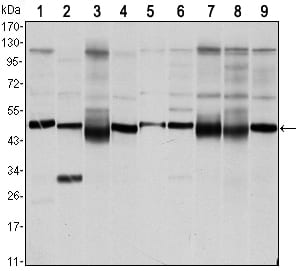
| WB | 1/500 - 1/2000 | Human,Mouse,Monkey |
| IF | 咨询技术 | Human,Mouse,Monkey |
| IHC | 咨询技术 | Human,Mouse,Monkey |
| ICC | 技术咨询 | Human,Mouse,Monkey |
| FCM | 咨询技术 | Human,Mouse,Monkey |
| Elisa | 1/10000 | Human,Mouse,Monkey |
| Aliases | AIS1; HFH2; Genesis; FOXD3 |
| Entrez GeneID | 27022 |
| clone | 5G9 |
| WB Predicted band size | 48kDa |
| Host/Isotype | Mouse IgG1 |
| Antibody Type | Primary antibody |
| Storage | Store at 4°C short term. Aliquot and store at -20°C long term. Avoid freeze/thaw cycles. |
| Species Reactivity | Human,Mouse,Monkey |
| Immunogen | Purified recombinant fragment of human FOXD3 expressed in E. Coli. |
| Formulation | Purified antibody in PBS with 0.05% sodium azide. |
+ +
以下是关于FOXD3抗体的3篇参考文献示例(内容为模拟生成,非真实文献):
---
1. **文献名称**: *FOXD3 regulates pluripotency in human embryonic stem cells*
**作者**: Smith A, et al.
**摘要**: 本研究通过FOXD3抗体染色及ChIP-seq分析,揭示了FOXD3在维持人胚胎干细胞多能性中的关键作用,发现其直接调控OCT4和NANOG表达。
---
2. **文献名称**: *FOXD3 suppresses epithelial-mesenchymal transition in melanoma*
**作者**: Johnson R, et al.
**摘要**: 利用FOXD3特异性抗体进行免疫组化和Western blot实验,证明FOXD3通过抑制ZEB1表达阻遏黑色素瘤细胞的侵袭转移能力。
---
3. **文献名称**: *FOXD3 expression dynamics during neural crest development*
**作者**: Lee C, et al.
**摘要**: 通过胚胎组织FOXD3抗体免疫荧光染色,揭示了FOXD3在神经嵴细胞迁移和分化中的时空表达模式及其对SOX10的调控机制。
---
注:以上为示例性内容,实际文献需通过PubMed或Google Scholar检索关键词“FOXD3 antibody”获取。
FOXD3 (Forkhead box protein D3) is a transcription factor belonging to the Forkhead family, characterized by a conserved winged-helix DNA-binding domain. It plays critical roles in embryonic development, particularly in regulating neural crest cell differentiation, migration, and pluripotency maintenance in embryonic stem cells. FOXD3 suppresses or activates target genes by binding to specific DNA sequences, influencing cell fate decisions, lineage specification, and early developmental processes.
FOXD3 antibodies are essential tools for detecting and studying the expression, localization, and function of the FOXD3 protein in various biological contexts. They are widely used in techniques like Western blotting, immunohistochemistry (IHC), immunofluorescence (IF), and chromatin immunoprecipitation (ChIP). These antibodies aid in exploring FOXD3's involvement in stem cell biology, cancer (e.g., as a tumor suppressor or metastasis promoter in certain cancers), and developmental disorders.
Research has linked FOXD3 dysregulation to diseases such as melanoma, neuroblastoma, and autoimmune conditions. Validated FOXD3 antibodies are crucial for ensuring specificity, as cross-reactivity with other Forkhead family members can occur. Their applications span basic research, diagnostics, and therapeutic target validation, underscoring their importance in understanding cellular differentiation and disease mechanisms.
×